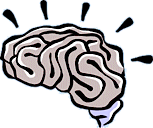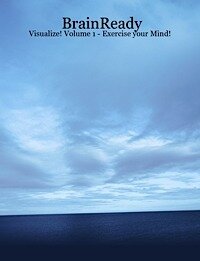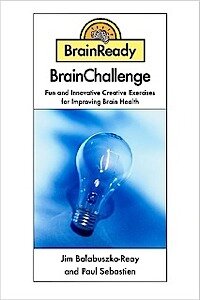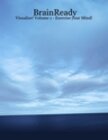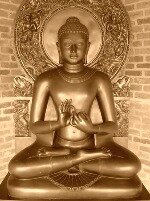
When Buddhism, neuroscience and brain training collide, wonderful things can happen...to you?
The ongoing march of scientific progress is commonly viewed as separate, or at least distinct, from such areas as philosophy and religion, particularly in the West. And for many, trying to apply new learning or research findings to our everyday, practical busy lives is difficult at best; we hear a nugget there, we read a snippet there, but seldom do we encounter truly life-changing, mind-shaping new knowledge. Particularly knowledge that combine the best of science AND philosophy or religion.
But what if you learned that there's an unprecedented, "quiet convergence" happening at the intersection of neuroscience, quantum physics, brain health, philosophy and religion? Something that might shake the very foundation of how you view not only your brain health and mental well-being, but also your fundamental view of the nature of your everyday reality? And how you can actually change your habits, preconceived beliefs and routines for the better, just by thinking?
These are just some of the things you'll learn about in an exciting (if not revolutionary) new book that one of our BrainReady readers (David Gomes...thanks again, David!) tipped us off to recently: by Sharon Begley.
Anyone keenly interested in either the topics of Neuroplasticity or the intersection between Buddhism and science may already be familiar with Sharon's book, but the topics and implications discussed in the book go far beyond these areas -- so much so that found ourselves continually reading between the lines, pausing and thinking, "wait a minute...this means that I could get rid of that old bad habit of mine while making huge progress and becoming more productive, just by focusing thought on x, y and z".
But selfish personal improvement application doesn't do justice to some of the jaw-dropping findings (both from scientific research as well as from discussion of parallels between philosophy and science) that are interspersed throughout, all presented without unnecessary hype yet far from being dry.
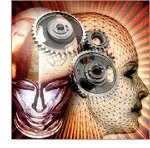 What's also exciting is how truly RECENT and new all of this is: the groundbreaking meeting and discussions between some of the world's leading neuroscientists and quantum physicists with the Dalai Lama and other Buddhist scholars happened in 2004, and as recently as 1999, neurologists writing in the prestigious journal Science admitted, "We are still taught that the fully mature brain lacks the intrinsic mechanisms needed to replenish neurons and reestablish neuronal networks after acute injury or in response to the insidious loss of neurons seen in neuro-degenerative diseases."
What's also exciting is how truly RECENT and new all of this is: the groundbreaking meeting and discussions between some of the world's leading neuroscientists and quantum physicists with the Dalai Lama and other Buddhist scholars happened in 2004, and as recently as 1999, neurologists writing in the prestigious journal Science admitted, "We are still taught that the fully mature brain lacks the intrinsic mechanisms needed to replenish neurons and reestablish neuronal networks after acute injury or in response to the insidious loss of neurons seen in neuro-degenerative diseases."
Begley cites the example of neuroscientist Fred Gage, one of the researchers invited by the Dalai Lama to discuss the implications of neuroplasticity with him and other Buddhist scholars at the 2004 meeting:
"But the dogma is wrong. In the last years of the twentieth century, a few iconoclastic neuroscientists challenged the paradigm that the adult brain cannot change and made discovery after discovery that, to the contrary, it retains stunning powers of neuroplasticity. The brain can indeed be rewired. It can expand the area that is wired to move the fingers, forging new connections that underpin the dexterity of an accomplished violinist. It can activate long-dormant wires and run new cables like an electrician bringing an old house up to code, so that regions that once saw can instead feel or hear. It can quiet circuits that once crackled with the aberrant activity that characterizes depression and cut pathological connections that keep the brain in the oh-god-something-is-wrong state that marks obsessive-compulsive disorder.
The adult brain, in short, retains much of the plasticity of the developing brain, including the power to repair damaged regions, to grow new neurons, to rezone regions that performed one task and have them assume a new task, to change the circuitry that weaves neurons into the networks that allow us to remember, feel, suffer, think, imagine, and dream. Yes, the brain of a child is remarkably malleable. But contrary to Ramón y Cajal and most neuroscientists since, the brain can change its physical structure and its wiring long into adulthood."
Wow.
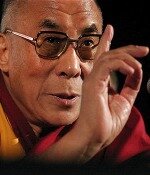
But that's just the neuroplasticity angle -- the parallels with Buddhism (and other areas of science as well, such as quantum physics) are equally fascinating, and presented largely objectively...this is not a Buddhist book nor an attempt to convert anyone.
Although it's hard not to be impressed with some of the tenets, particularly the eerily same-as-science-has-recently-found ones given that these tenets are thousands of years old. And regardless of what your personal religion or life philosophy might be, some Buddhist practices such as meditation may become even more worth investigating after reading this book. This is certainly true for us, and anyone interested in optimal brain health and mental well-being as one ages...
In short, it's a great read -- if not a life-changing read, or listen: for those who have a hard time finding the time for a hardcover book, are visually challenged, or have turned into iPod/Audiobook freaks (like we are here at BrainReady...hence the BrainReady audio-based brain exercises!), this book is available in either or a great , which you could listen to in your car or at home on your stereo.
Either way, it's worth your time.
(For another incredible, potentially life-changing and controversial read, we also highly recommend Ray Kurzweil's )
Share your views and let us (and other BrainReady readers) know what YOU think -- discuss by clicking the 'Comments' link below!
- The BrainReady Team
